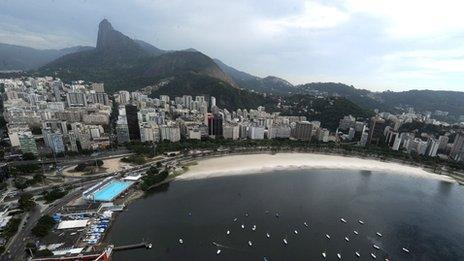Nations at odds on Rio+20 earth summit
- Published
- comments

Brazil will host the summit, and has pressing issues of its own
The final round of negotiations leading up to next week's Rio+20 summit begins on Wednesday with countries very much at odds on key issues.
The draft agreement would improve energy, water and food security in poorer countries, phase out fossil fuel subsidies and boost ocean protection.
But with three days of negotiations left, only 20% has been agreed.
One source close to the talks told BBC News that negotiators had been talking about punctuation, not principles.
The summit is widely seen as a crucial opportunity for leaders to put the global economy on a more sustainable footing.
The draft agreement - titled The Future We Want - is riddled with deletions, many instigated by the US and many by the G77/China bloc of developing nations.
Russia, Japan, the EU and other parties have also objected to key clauses.
The draft has been criticised in some quarters as being too lenient on businesses, especially major banks and commodity corporations.
"The Rio Earth Summit will not bring about the Future We Want, it will provide a stark and distressing reminder of the present we have," said Kumi Naidoo, executive director of Greenpeace International.
"A world in which public health, human rights and sustainable development are subordinate to private profit, shallow national interest and 'business as usual'."
There is also a row over the proposed sustainable development goals (SDGs), which would seek to relieve poverty and improve health, education and jobs in developing countries, but along environmentally and socially sustainable lines.
Some aid agencies fear this will result in a watering down of the key commitment to helping people out of poverty, contained in the Millennium Development Goals (MDGs).
There is also a lack of agreement on whether the SDGs should commit rich countries to curbing their consumption of natural resources, in order to leave more for the poor.
'Opportunity squandered'
In a widely-circulated editorial, former Soviet President Mikhail Gorbachev, who now runs Green Cross International, contrasted the "optimism and hope" of the Rio Earth Summit 20 years ago with the "cynicism and despair" surrounding this one.
"I feel bitter when I look at the cavernous gulf between rich and poor, the irresponsibility that caused the global financial crisis, the weak and divided responses to climate change, and the failure to achieve the MDGs," he said.
"The opportunity to build a safer, fairer and more united world has been largely squandered."
The eight rounds of formal and informal preparatory talks since the beginning of the year have been bedevilled by problems of substance as well as of process.
Some Western nations, especially the US, appear unwilling to give ground on anything that would help rival up-and-coming economic powers, in particular China.
They, meanwhile, are reluctant to countenance any language that could put a brake on their development.
The summit also falls in a difficult political period, with the US presidential election due later this year, an impending change of Chinese leadership, and many nations struggling under various financial issues.
Following the close of the preparatory negotiations this coming Friday, there will be four days of informal dialogues and other meetings before heads of government and ministers begin the summit proper next Wednesday.
There is widespread disappointment among activists that scores of leaders including the UK's David Cameron, Germany's Angela Merkel and US President Barack Obama have chosen to stay away.
The US has however confirmed that its delegation will be led by Secretary of State Hillary Clinton.
- Published11 June 2012